Mises, Ludwig von. Theory and History: An Interpretation of Social and Economic Evolution
Подождите немного. Документ загружается.

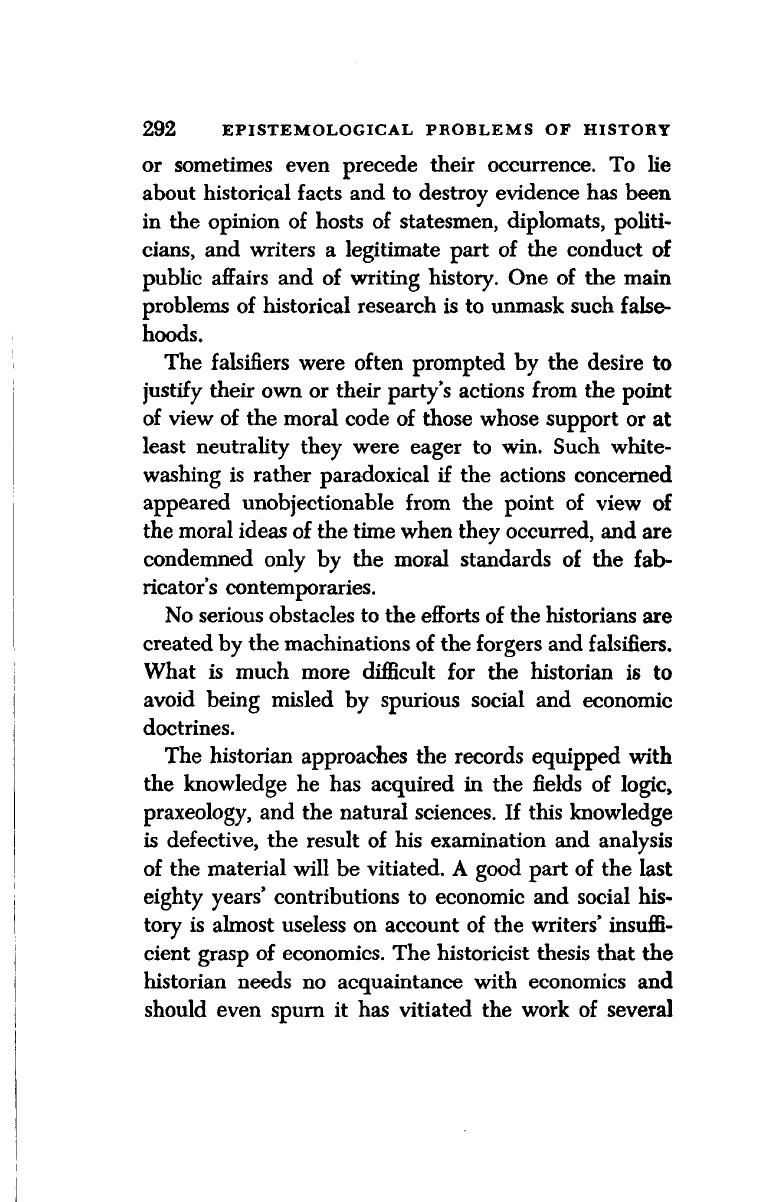
292 EPISTEMOLOGICAL PROBLEMS OF HISTORY
or sometimes even precede their occurrence. To lie
about historical facts and to destroy evidence has been
in the opinion of hosts of statesmen, diplomats, politi-
cians,
and writers a legitimate part of the conduct of
public affairs and of writing history. One of the main
problems of historical research is to unmask such false-
hoods.
The falsifiers were often prompted by the desire to
justify their own or their party's actions from the point
of view of the moral code of those whose support or at
least neutrality they were eager to win. Such white-
washing is rather paradoxical if the actions concerned
appeared unobjectionable from the point of view of
the moral ideas of the time when they occurred, and are
condemned only by the moral standards of the fab-
ricator's contemporaries.
No serious obstacles to the efforts of the historians are
created by the machinations of the forgers and falsifiers.
What is much more difficult for the historian is to
avoid being misled by spurious social and economic
doctrines.
The historian approaches the records equipped with
the knowledge he has acquired in the fields of logic,
praxeology, and the natural sciences. If this knowledge
is defective, the result of his examination and analysis
of the material will be vitiated. A good part of the last
eighty years' contributions to economic and social his-
tory is almost useless on account of the writers' insuffi-
cient grasp of economics. The historicist thesis that the
historian needs no acquaintance with economics and
should even spurn it has vitiated the work of several
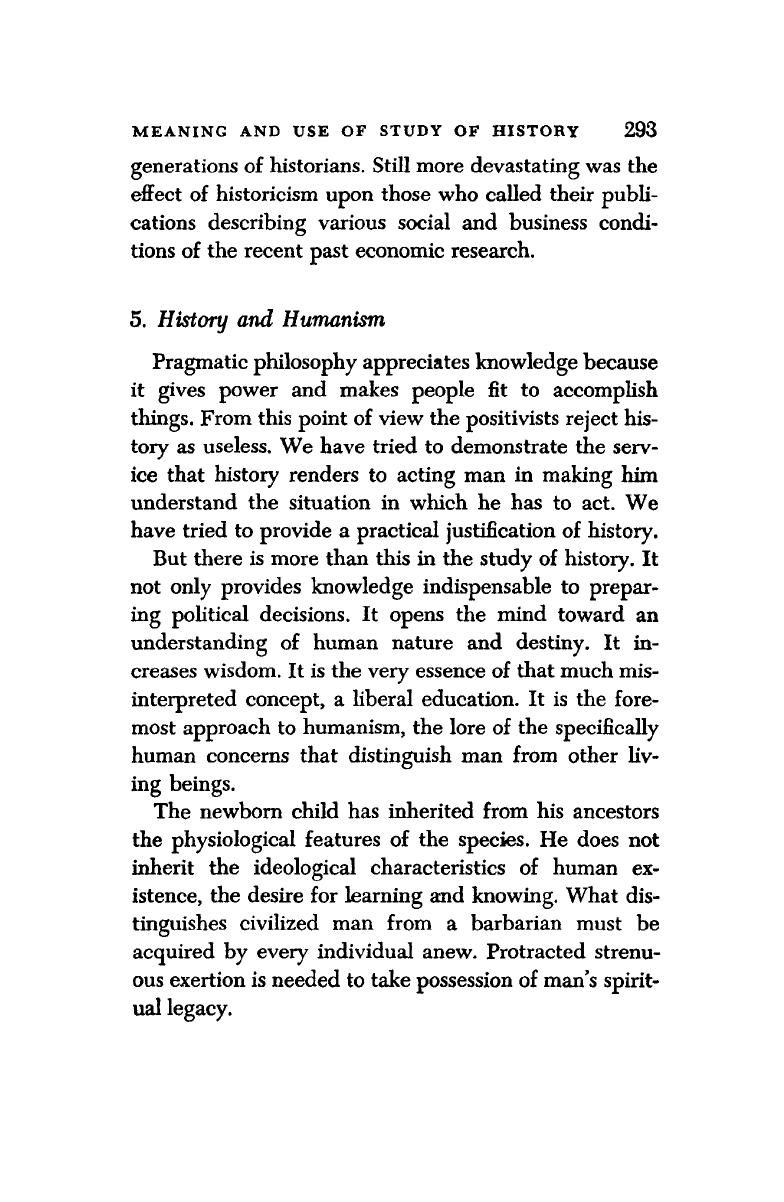
MEANING AND USE OF STUDY OF HISTORY 293
generations of historians. Still more devastating was the
effect of historicism upon those who called their publi-
cations describing various social and business condi-
tions of the recent past economic research.
5. History and Humanism
Pragmatic philosophy appreciates knowledge because
it gives power and makes people fit to accomplish
things. From this point of view the positivists reject his-
tory as useless. We have tried to demonstrate the serv-
ice that history renders to acting man in making him
understand the situation in which he has to act. We
have tried to provide a practical justification of history.
But there is more than this in the study of history. It
not only provides knowledge indispensable to prepar-
ing political decisions. It opens the mind toward an
understanding of human nature and destiny. It in-
creases wisdom. It is the very essence of that much mis-
interpreted concept, a liberal education. It is the fore-
most approach to humanism, the lore of the specifically
human concerns that distinguish man from other liv-
ing beings.
The newborn child has inherited from his ancestors
the physiological features of the species. He does not
inherit the ideological characteristics of human ex-
istence, the desire for learning and knowing. What dis-
tinguishes civilized man from a barbarian must be
acquired by every individual anew. Protracted strenu-
ous exertion is needed to take possession of man's spirit-
ual legacy.
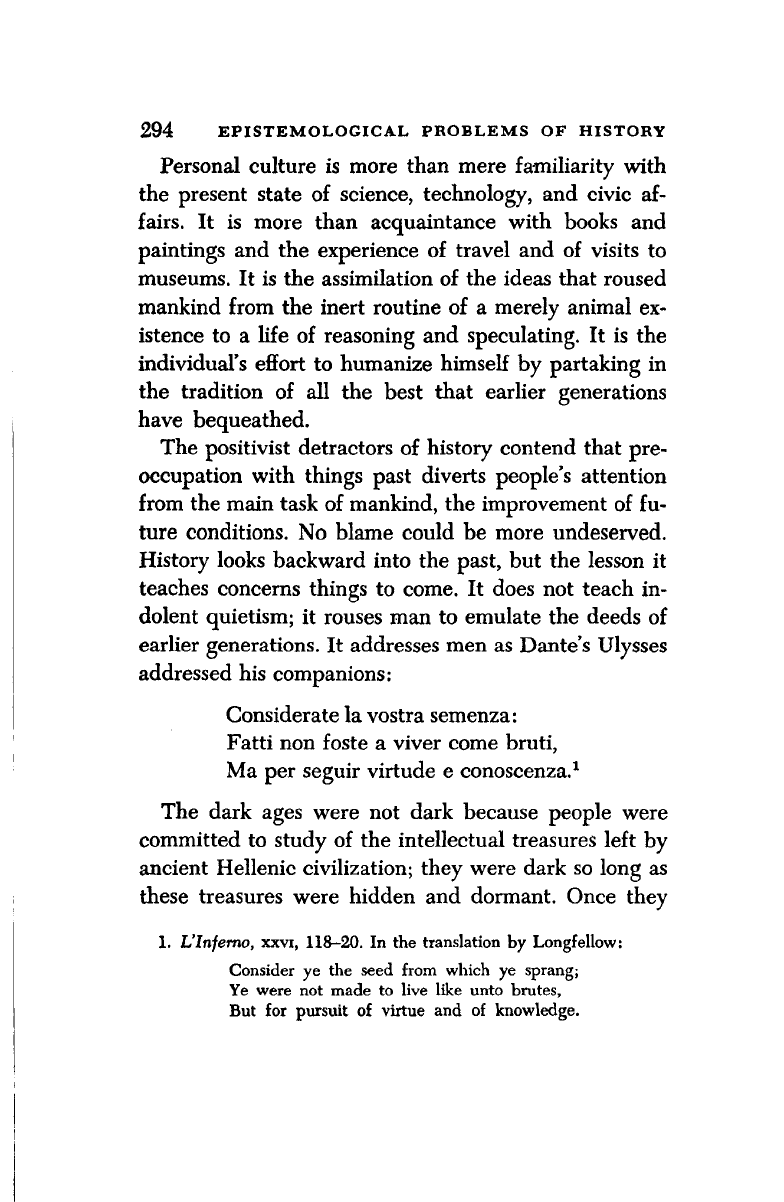
294 EPISTEMOLOGICAL PROBLEMS OF HISTORY
Personal culture is more than mere familiarity with
the present state of science, technology, and civic af-
fairs.
It is more than acquaintance with books and
paintings and the experience of travel and of visits to
museums. It is the assimilation of the ideas that roused
mankind from the inert routine of a merely animal ex-
istence to a Me of reasoning and speculating. It is the
individual's effort to humanize himself by partaking in
the tradition of all the best that earlier generations
have bequeathed.
The positivist detractors of history contend that pre-
occupation with things past diverts people's attention
from the main task of mankind, the improvement of fu-
ture conditions. No blame could be more undeserved.
History looks backward into the past, but the lesson it
teaches concerns things to come. It does not teach in-
dolent quietism; it rouses man to emulate the deeds of
earlier generations. It addresses men as Dante's Ulysses
addressed his companions:
Considerate la vostra semenza:
Fatti non foste a viver come bruti,
Ma per seguir virtude e conoscenza.
1
The dark ages were not dark because people were
committed to study of the intellectual treasures left by
ancient Hellenic civilization; they were dark so long as
these treasures were hidden and dormant. Once they
1.
L'Inferno, xxvi, 118-20. In the translation by Longfellow:
Consider ye the seed from which ye sprang;
Ye were not made to live like unto brutes,
But for pursuit of virtue and of knowledge.
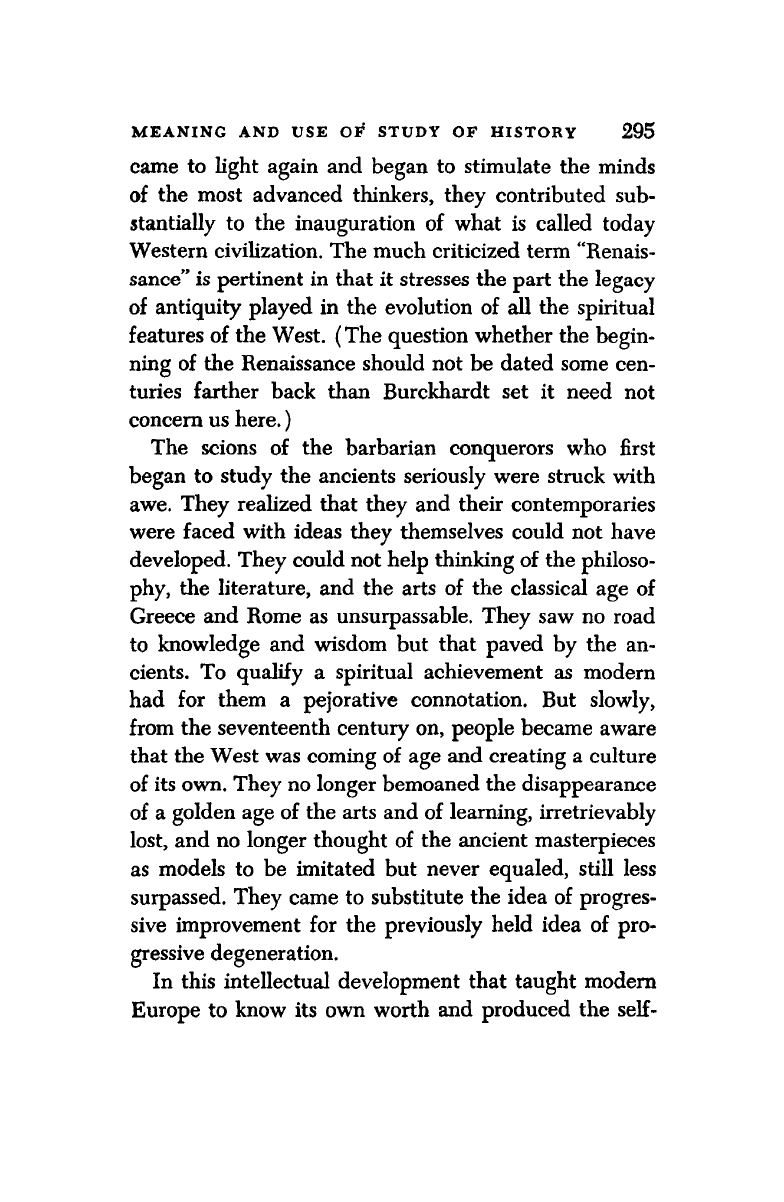
MEANING AND USE OF STUDY OF HISTORY 295
came to light again and began to stimulate the minds
of the most advanced thinkers, they contributed sub-
stantially to the inauguration of what is called today
Western civilization. The much criticized term "Renais-
sance" is pertinent in that it stresses the part the legacy
of antiquity played in the evolution of all the spiritual
features of the West. (The question whether the begin-
ning of the Renaissance should not be dated some cen-
turies farther back than Burckhardt set it need not
concern us here.)
The scions of the barbarian conquerors who first
began to study the ancients seriously were struck with
awe. They realized that they and their contemporaries
were faced with ideas they themselves could not have
developed. They could not help thinking of the philoso-
phy, the literature, and the arts of the classical age of
Greece and Rome as unsurpassable. They saw no road
to knowledge and wisdom but that paved by the an-
cients. To qualify a spiritual achievement as modern
had for them a pejorative connotation. But slowly,
from the seventeenth century on, people became aware
that the West was coming of age and creating a culture
of its own. They no longer bemoaned the disappearance
of a golden age of the arts and of learning, irretrievably
lost, and no longer thought of the ancient masterpieces
as models to be imitated but never equaled, still less
surpassed. They came to substitute the idea of progres-
sive improvement for the previously held idea of pro-
gressive degeneration.
In this intellectual development that taught modern
Europe to know its own worth and produced the
self-
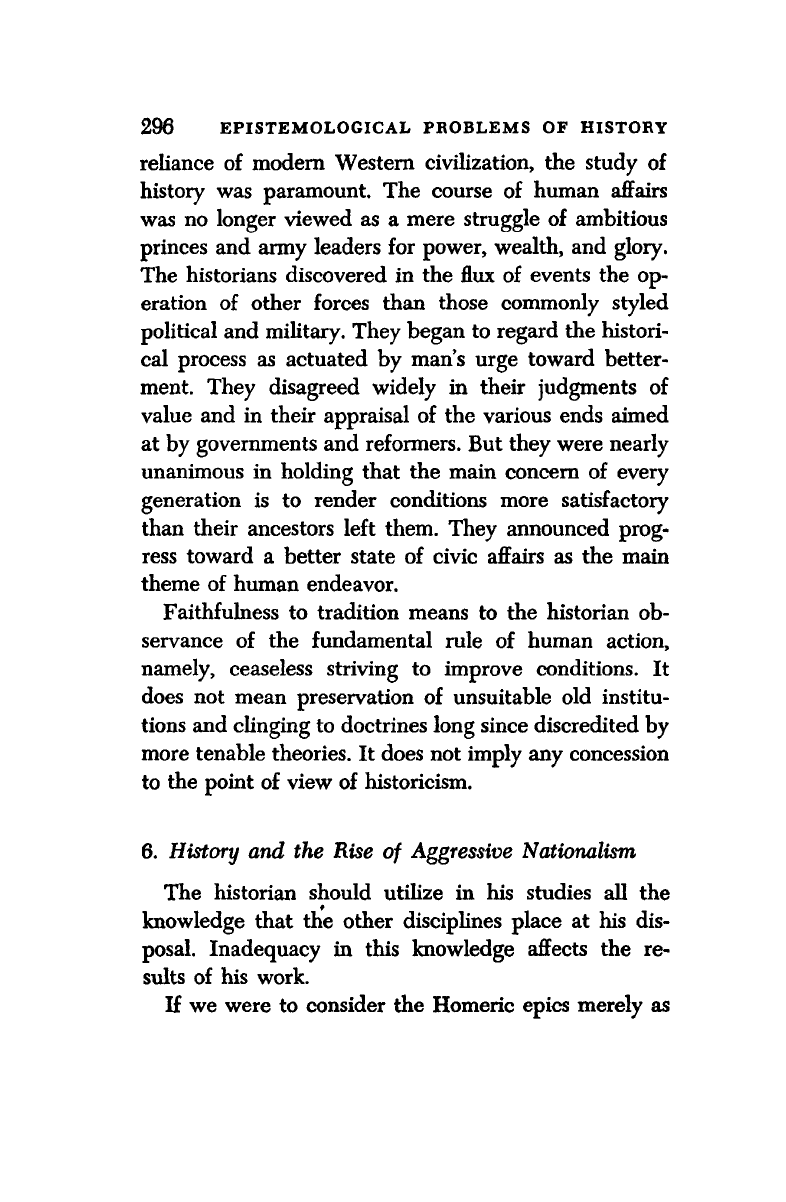
296 EPISTEMOLOGICAL PROBLEMS OF HISTORY
reliance of modern Western civilization, the study of
history was paramount. The course of human affairs
was no longer viewed as a mere struggle of ambitious
princes and army leaders for power, wealth, and glory.
The historians discovered in the flux of events the op-
eration of other forces than those commonly styled
political and military. They began to regard the histori-
cal process as actuated by man's urge toward better-
ment. They disagreed widely in their judgments of
value and in their appraisal of the various ends aimed
at by governments and reformers. But they were nearly
unanimous in holding that the main concern of every
generation is to render conditions more satisfactory
than their ancestors left them. They announced prog-
ress toward a better state of civic affairs as the main
theme of human endeavor.
Faithfulness to tradition means to the historian ob-
servance of the fundamental rule of human action,
namely, ceaseless striving to improve conditions. It
does not mean preservation of unsuitable old institu-
tions and clinging to doctrines long since discredited by
more tenable theories. It does not imply any concession
to the point of view of historicism.
6. History and the Rise of Aggressive Nationalism
The historian should utilize in his studies all the
knowledge that the other disciplines place at his dis-
posal. Inadequacy in this knowledge affects the re-
sults of his work.
If we were to consider the Homeric epics merely as
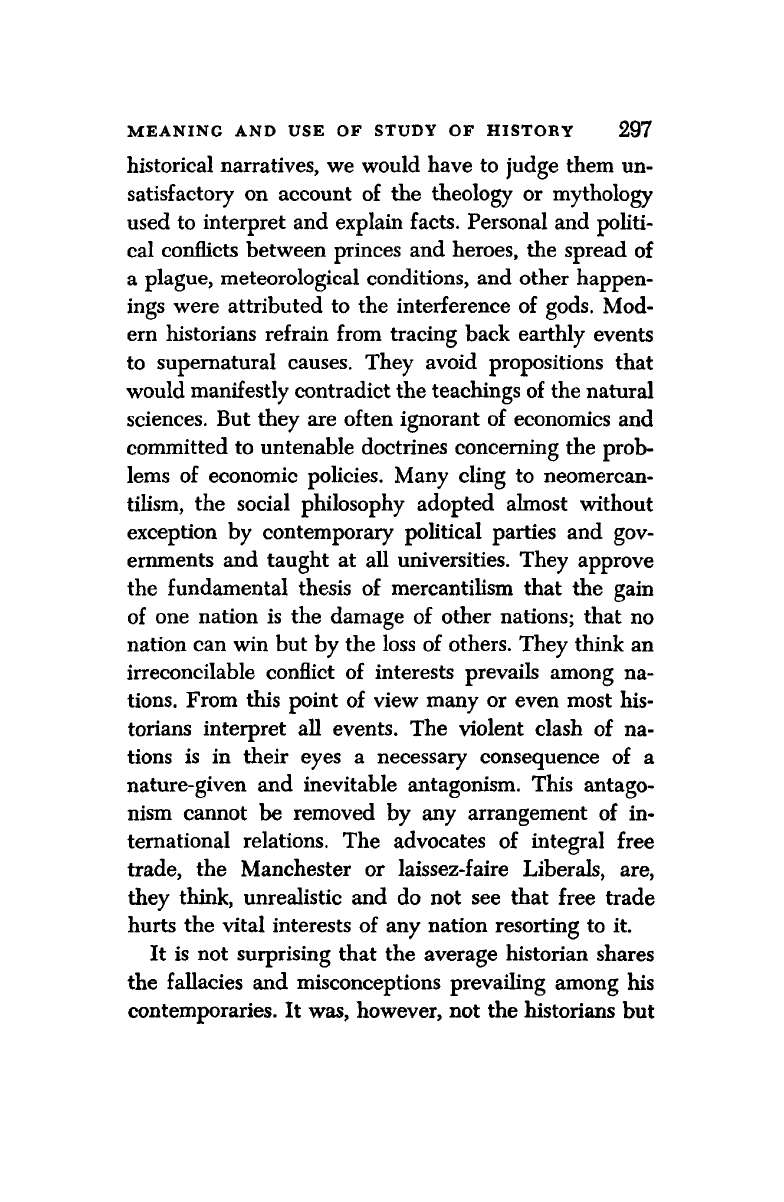
MEANING AND USE OF STUDY OF HISTORY 297
historical narratives, we would have to judge them un-
satisfactory on account of the theology or mythology
used to interpret and explain facts. Personal and politi-
cal conflicts between princes and heroes, the spread of
a plague, meteorological conditions, and other happen-
ings were attributed to the interference of gods. Mod-
ern historians refrain from tracing back earthly events
to supernatural causes. They avoid propositions that
would manifestly contradict the teachings of the natural
sciences. But they are often ignorant of economics and
committed to untenable doctrines concerning the prob-
lems of economic policies. Many cling to neomercan-
tilism, the social philosophy adopted almost without
exception by contemporary political parties and gov-
ernments and taught at all universities. They approve
the fundamental thesis of mercantilism that the gain
of one nation is the damage of other nations; that no
nation can win but by the loss of others. They think an
irreconcilable conflict of interests prevails among na-
tions.
From this point of view many or even most his-
torians interpret all events. The violent clash of na-
tions is in their eyes a necessary consequence of a
nature-given and inevitable antagonism. This antago-
nism cannot be removed by any arrangement of in-
ternational relations. The advocates of integral free
trade, the Manchester or laissez-faire Liberals, are,
they think, unrealistic and do not see that free trade
hurts the vital interests of any nation resorting to it.
It is not surprising that the average historian shares
the fallacies and misconceptions prevailing among his
contemporaries. It was, however, not the historians but
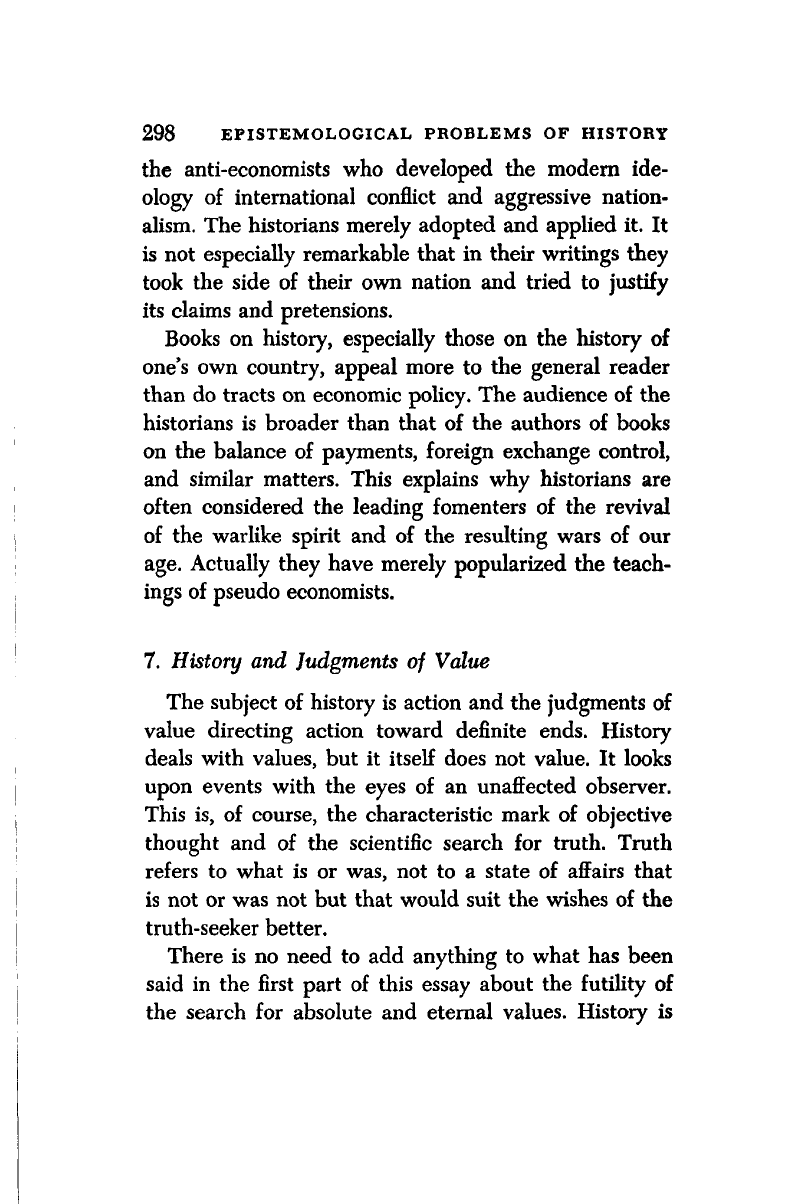
298 EPISTEMOLOGICAL PROBLEMS OF HISTORY
the anti-economists who developed the modern ide-
ology of international conflict and aggressive nation-
alism. The historians merely adopted and applied it. It
is not especially remarkable that in their writings they
took the side of their own nation and tried to justify
its claims and pretensions.
Books on history, especially those on the history of
one's own country, appeal more to the general reader
than do tracts on economic policy. The audience of the
historians is broader than that of the authors of books
on the balance of payments, foreign exchange control,
and similar matters. This explains why historians are
often considered the leading fomenters of the revival
of the warlike spirit and of the resulting wars of our
age.
Actually they have merely popularized the teach-
ings of pseudo economists.
7. History and Judgments of Value
The subject of history is action and the judgments of
value directing action toward definite ends. History
deals with values, but it itself does not value. It looks
upon events with the eyes of an unaffected observer.
This is, of course, the characteristic mark of objective
thought and of the scientific search for truth. Truth
refers to what is or was, not to a state of affairs that
is not or was not but that would suit the wishes of the
truth-seeker better.
There is no need to add anything to what has been
said in the first part of this essay about the futility of
the search for absolute and eternal values. History is
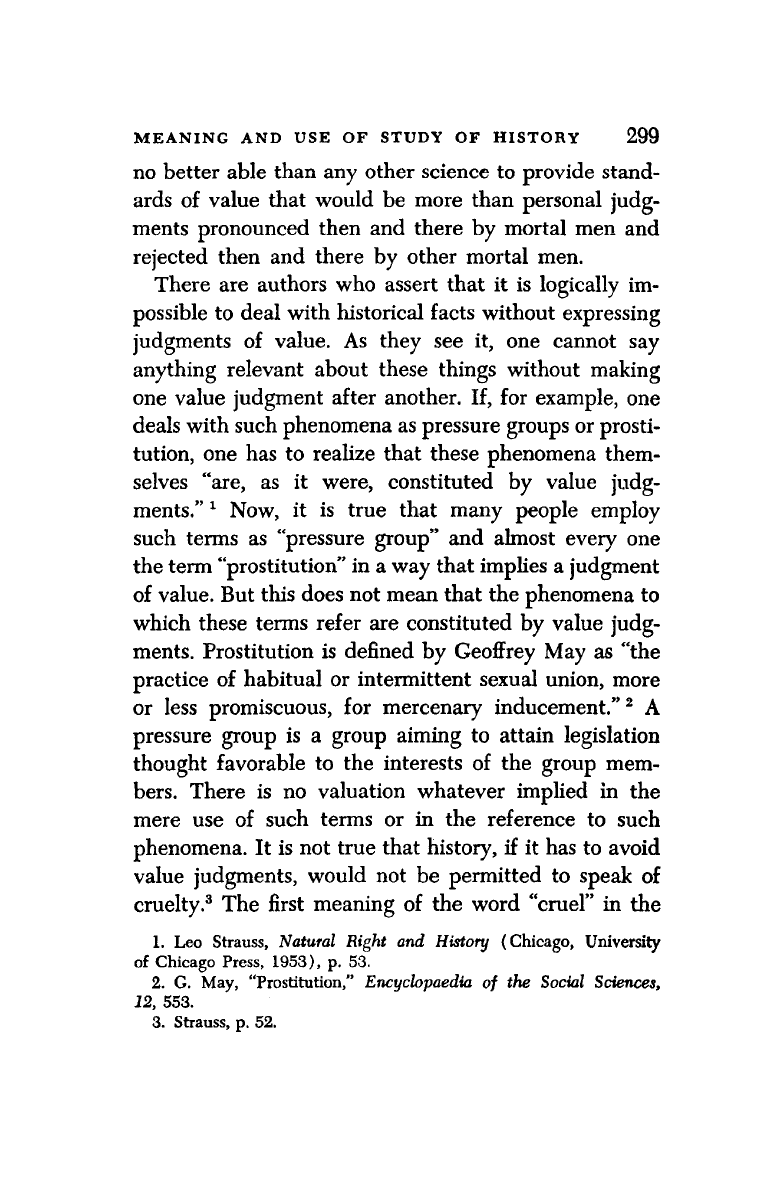
MEANING AND USE OF STUDY OF HISTORY 299
no better able than any other science to provide stand-
ards of value that would be more than personal judg-
ments pronounced then and there by mortal men and
rejected then and there by other mortal men.
There are authors who assert that it is logically im-
possible to deal with historical facts without expressing
judgments of value. As they see it, one cannot say
anything relevant about these things without making
one value judgment after another. If, for example, one
deals with such phenomena as pressure groups or prosti-
tution, one has to realize that these phenomena them-
selves "are, as it were, constituted by value judg-
ments ."
x
Now, it is true that many people employ
such terms as "pressure group" and almost every one
the term "prostitution" in a way that implies a judgment
of value. But this does not mean that the phenomena to
which these terms refer are constituted by value judg-
ments. Prostitution is defined by Geoffrey May as "the
practice of habitual or intermittent sexual union, more
or less promiscuous, for mercenary inducement/'
2
A
pressure group is a group aiming to attain legislation
thought favorable to the interests of the group mem-
bers.
There is no valuation whatever implied in the
mere use of such terms or in the reference to such
phenomena. It is not true that history, if it has to avoid
value judgments, would not be permitted to speak of
cruelty.
3
The first meaning of the word "cruel" in the
1.
Leo Strauss, Natural Right and History (Chicago, University
of Chicago Press, 1953), p. 53.
2.
G. May,
"Prostitution,"
Encyclopaedia
of the
Social
Sciences,
12,
553.
3.
Strauss, p. 52.
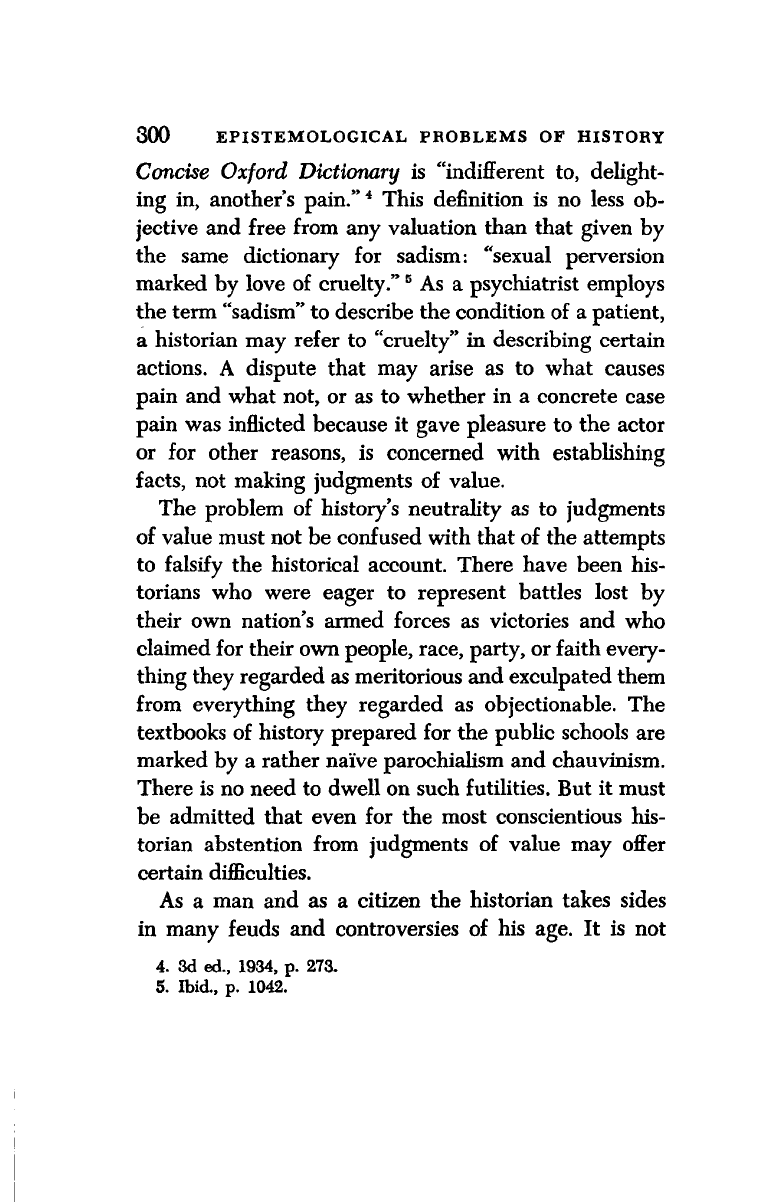
300 EPISTEMOLOGICAL PROBLEMS OF HISTORY
Concise Oxford Dictionary is "indifferent to, delight-
ing in, another's pain."
4
This definition is no less ob-
jective and free from any valuation than that given by
the same dictionary for sadism: "sexual perversion
marked by love of cruelty."
5
As a psychiatrist employs
the term "sadism" to describe the condition of a patient,
a historian may refer to "cruelty" in describing certain
actions. A dispute that may arise as to what causes
pain and what not, or as to whether in a concrete case
pain was inflicted because it gave pleasure to the actor
or for other reasons, is concerned with establishing
facts,
not making judgments of value.
The problem of history's neutrality as to judgments
of value must not be confused with that of the attempts
to falsify the historical account. There have been his-
torians who were eager to represent battles lost by
their own nation's armed forces as victories and who
claimed for their own people, race, party, or faith every-
thing they regarded as meritorious and exculpated them
from everything they regarded as objectionable. The
textbooks of history prepared for the public schools are
marked by a rather naive parochialism and chauvinism.
There is no need to dwell on such futilities. But it must
be admitted that even for the most conscientious his-
torian abstention from judgments of value may offer
certain difficulties.
As a man and as a citizen the historian takes sides
in many feuds and controversies of his age. It is not
4.
3d ed., 1934, p. 273.
5. Ibid., p. 1042.
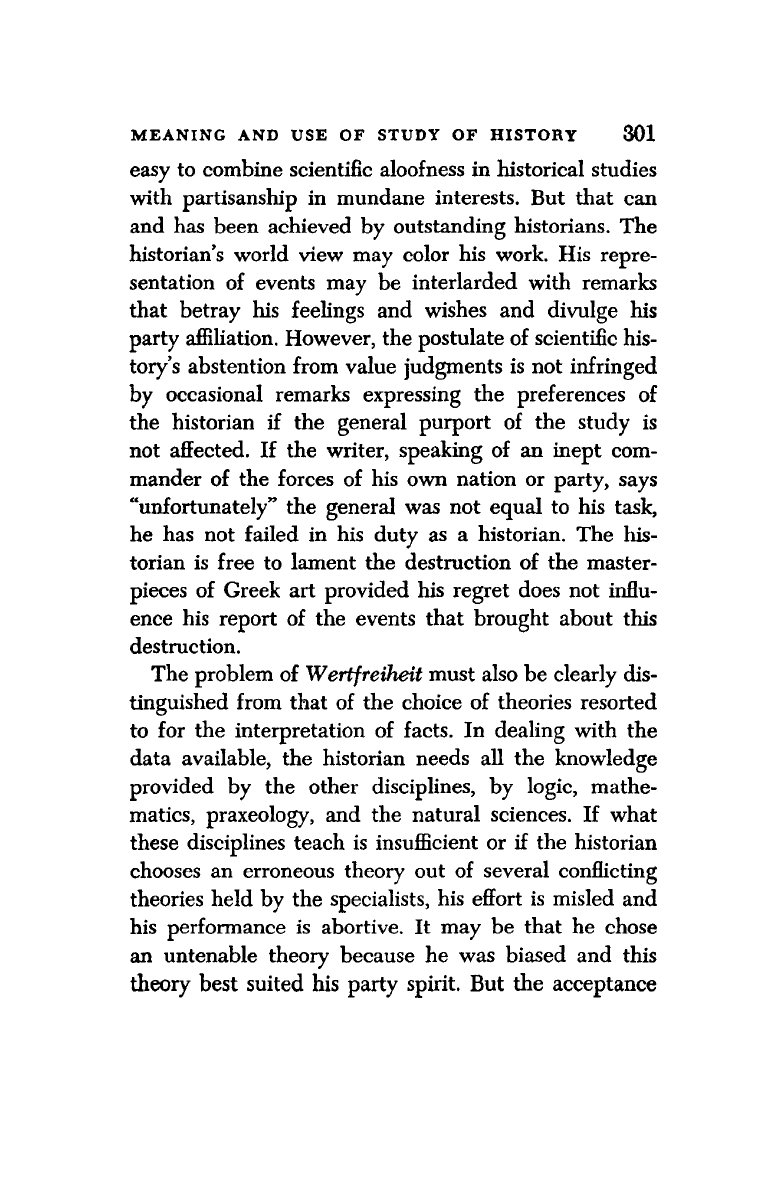
MEANING AND USE OF STUDY OF HISTORY 301
easy to combine scientific aloofness in historical studies
with partisanship in mundane interests. But that can
and has been achieved by outstanding historians. The
historian's world view may color his work. His repre-
sentation of events may be interlarded with remarks
that betray his feelings and wishes and divulge his
party affiliation. However, the postulate of scientific his-
tory's abstention from value judgments is not infringed
by occasional remarks expressing the preferences of
the historian if the general purport of the study is
not affected. If the writer, speaking of an inept com-
mander of the forces of his own nation or party, says
"unfortunately*' the general was not equal to his task,
he has not failed in his duty as a historian. The his-
torian is free to lament the destruction of the master-
pieces of Greek art provided his regret does not influ-
ence his report of the events that brought about this
destruction.
The problem of Wertfreiheit must also be clearly dis-
tinguished from that of the choice of theories resorted
to for the interpretation of facts. In dealing with the
data available, the historian needs all the knowledge
provided by the other disciplines, by logic, mathe-
matics, praxeology, and the natural sciences. If what
these disciplines teach is insufficient or if the historian
chooses an erroneous theory out of several conflicting
theories held by the specialists, his effort is misled and
his performance is abortive. It may be that he chose
an untenable theory because he was biased and this
theory best suited his party spirit. But the acceptance
